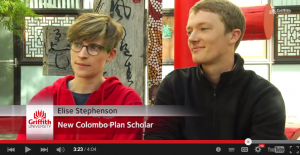An internship abroad is a costly investment, financially, socially and time-wise. But the appeal of a work placement is growing, along with the rise of commercial companies offering to set up an internship and the number of universities and governments keen to enable such an opportunity.
News and business analysis for Professionals in International Education
Have some pie!
International internships: how is this sector evolving?
 Photo: Twin Group
Photo: Twin Group Businesses, educators and associations across the world are now moving away from the black cloud of exploitation and elitism, to foster a more controlled, open and incentivised internship landscape that in many cases can be backed by a national ambition to internationalise.
For example, the Australian government recently committed AUS$10m of funding towards the next phase of the New Colombo Plan (NCP), which has already dispatched over 1,300 Australian students from 38 of the country’s universities to Singapore, Indonesia, Hong Kong and Japan for work and study placements.
“These days we also speak specifically about the need to be ‘Asia literate'”
“The NCP is an idea that has found its moment in Australia. Every year, for the last five years, the number of Australians heading overseas has grown,” comments Ainslie Moore, Policy Director International, Universities Australia.
Total government funding of AUS$100m over five years will allow the NCP to extend the host locations from four to over 30, making Asia a ‘rite of passage’ for Australian students.
“We often talk about cultural competencies and the importance of understanding culture in business and these days we also speak specifically about the need to be ‘Asia literate,’” says Moore.
“The NCP internships give students personal growth as they become more independent, flexible and open to alternative perspectives, while increasing their confidence. Interning in Asia also really sets them apart as they build their careers.”
Elise Stephenson at Griffith University in Brisbane, speaking in a video about the NCP, quips, “I think it will phenomenally change my life”.
Sydney-based Macquarie University is just one Australian institution to take advantage of the NCP through its PACE (Professional and Community Engagement) programme. Currently over 60% of its undergraduates complete PACE as part of their degree, and each year over 200 students venture overseas.
“In the faculty of Business and Economics, we have industry partners in India and Singapore who take our students each year on business projects,” explains Leanne Carter, Faculty Academic Director for PACE.
“There is a great deal of work that can be undertaken by students in developing countries, where we can make a real difference”
While the bulk of overseas internships are undertaken in Asia, Carter notes that the university also works with AVI (Australian Volunteers International), to send students to underprivileged countries.
“There is a great deal of work that can be undertaken by students in developing countries, where we can make a real difference.”
Universities in the UK are also working hard to improve outbound student mobility through internships.
The number of Exeter University students who have secured an internship overseas before they start their final year has increased from 23% in 2011 to 64% in 2014, in part due to new mandatory skills development and work preparatory programme ‘eXfactor’, completed by all first year students.
“Overseas placements are a growing priority for the university and its students, with the number supported growing by a third each year over the last three years,” notes Paul Blackmore, Head of Employability & Graduate Development at the University of Exeter.
“Further pastoral and financial support will be increased significantly over the next few years to ensure that Exeter students acquire the global competencies and intercultural awareness being demanded by all employers, large and small,” says Blackmore.
Inbound non-EEA students visiting the UK can also apply for internships through Tier 4 summer placements, Tier 5 placements, university one-year sandwich placements and working holiday visas.
In Australia, internship opportunities abroad can also be organised for international students. Brad Dorahy of CIS Australia explains, “About 10-15% of our business is international students in Australia heading abroad again on another short-term mobility experience.”
For Colin Chen, Managing Director of Overseas Student Service Centre (OSSC) in the UK, a challenge for his company – a consultancy that mainly deals with Middle Eastern, Chinese and Southeast Asian students in the UK – is enabling onshore opportunities: convincing UK businesses of the value of international students taking an internship.
“I think the main barrier affecting students then is the same as it is now: how to find an internship”
“I think the main barrier affecting students then is the same as it is now: how to find an internship,” says Chen. “We believe there is a huge pool of talented international students in the UK that can really help UK companies to stimulate their business.”
In the English language sector, the only provider to be granted sponsorship-awarding powers to non-EEA students by UKVI through the Tier 5 GAE (Government Authorised Exchange) is the Twin Group.
Twin won its powers this September, leading the way for future language schools to foster quality placements, as universities before them have done. CEO, Caroline Fox, is expectant that exporting businesses will see the value of short-term international interns. “We look forward to delivering a ‘Twin win win’ experience for companies and students alike.”
In Canada, businesses are definitely taking advantage of the talented pool of 1,300 Brazilian students entering the country on four-month internships through the Science Without Borders scheme.
“On the inbound, Canadian businesses and industry are interested in hosting international co-op students because they provide a fresh perspective and potential future access to counterpart businesses in their home country,” comments Jennifer Humphries, Vice-President, Membership, Public Policy and Communications, CBIE.
“International co-op students provide a fresh perspective and potential future access to counterpart businesses”
“Hosts include major corporations such as Unilever, CAE Mining and Blackberry. Just as important has been the enthusiastic participation of start-up and SMEs.”
Over many years, organisations such as AIESEC for the business world and IAESTE for the science and engineering world have built bridges between students and employers and most Canadian university campuses have chapters of these groups, making it a grassroots movement with global reach.
In the US, thousands of internships for international students have been facilitated over the last 50 years through its J-1 Intern programme. Foreign students can apply for placements of up to 12 months and the US Department of State works with around 77 organisations or “sponsors” across a number of sectors.
Robin Lerner, Deputy Assistant Secretary for Private Sector Exchange at the US Department of State, says historically, hospitality, tourism, agriculture and forestry have been popular sectors, but admits to a surge in interest around STEM subjects.
“The most successful exchange experiences often include cultural activities”
The Department of State is also promoting cultural components within placements: “The most successful exchange experiences often include cultural activities and we are encouraging sponsors and hosts to expand their efforts in this area.”
In order to increase the quality of placements, J-1 Intern sponsors are required to evaluate the performance of the intern, as well as the employer after six months.

A group of intern students in Medellin, Colombia enjoying a new way to get to know a culture overseas. Photo: The Intern Group
It’s not just government level that is committed to quality internships in the US. The Academic Internship Council (AIC), which organises domestic and international placements, recently merged with the Council on International Educational Exchange (CIEE), and looks set to become one of the world’s most powerful internship providers.
President, Tony Johnson, who has placed over 30,000 international students in internships over 30 years and is often considered the “grandfather of international internships”, predicts that global demand for internships will continue to grow.
He urges universities and businesses to collaborate more to accommodate this demand and asks that internships be a credit-forming part of higher education.
“All grey areas such as payment and visas need to be replaced with clearly understood guidelines”
He adds that regulation in various countries needs to become clearer: “All grey areas such as payment and visas need to be replaced with clearly understood guidelines that can be agreed upon by all universities, students and host companies.”
As well as regulation, clarification around the expectations of internships, seen from the student’s point of view, can also be beneficial for those considering placements.
One website that has put students back in the driving seat is US-based Go Overseas, founded in 2009 by Mitch Gordon & Andrew Dunkle.
Central to the core of the business is the student viewpoint. Go Overseas incentivises students to leave reviews to help other students through competitions such as its third annual ‘Leave-A-Review’ contest, with prizes such as travel vouchers, backpacks and other travel-related accessories.
Another portal incentivising students is Swedish-based Sqore, which as well as running competitions with internship prizes, promises to “revolutionise” the student CV.
“We project that students will become ever more mobile at the same time that international and cultural diversity becomes ever more important for employers”
“We project that students will become ever more mobile at the same time that international and cultural diversity becomes ever more important for employers,” says founder, Robert Lyngman.
“Sqore matches ideal international candidates to these employers, and ensures that a cross-cultural standard can be put in place by these companies who are looking at recruits from all types of backgrounds.”
David Lloyd, CEO of The Intern Group, which has sent students from 75 different countries overseas in the last 18 months alone, welcomes new third party players to the market: “While the international internship market is fast-growing, it is still a relatively new concept.”
Lloyd thinks other high-quality operators will “help to validate the industry and pushes everyone to raise performance standards.”
“One trend we have seen is that millennials who want to travel increasingly feel the need to justify their time doing so professionally,” he notes.
“For those who want to improve their employability in increasingly competitive job markets, interning abroad is the ideal way to travel while developing critical professional experience.”
As a new wave of commercialisation of international internships takes hold, education providers, businesses and governments will need to move quickly to cater for this burgeoning market. Collaboration will be key, and quality and transparency will hold together the mutual benefits for businesses and students alike.
Still looking? Find by category:




Thanks for sharing this blog, its very informative.
Thanks for sharing the information with us, it is very informative.